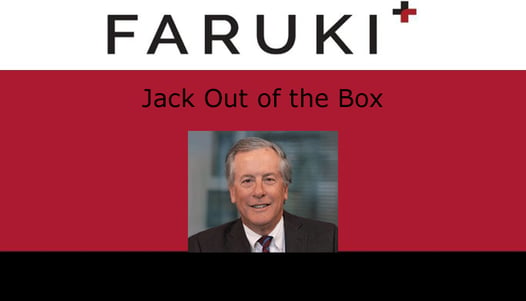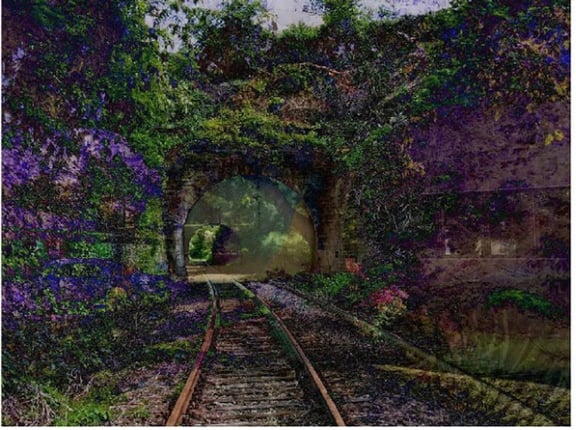- August 28, 2023
- Jack Greiner
- Jack Out of the Box
 Stephen Thaler owns a computer system called the "Creativity Machine." Mr. Thaler used the machine to generate a work of art entitled "A Recent Entrance to Paradise."
Stephen Thaler owns a computer system called the "Creativity Machine." Mr. Thaler used the machine to generate a work of art entitled "A Recent Entrance to Paradise."
 He sought to register the work for a copyright, listing the computer system as the author and explaining that the copyright should transfer to him as the owner of the machine. The Copyright Office denied the application because in its view, the work lacked human authorship, a prerequisite for a valid copyright to issue. Mr. Thaler challenged that denial. He filed a lawsuit in a Washington D.C. federal court against the United States Copyright Office and Shira Perlmutter, in her official capacity as the Register of Copyrights and the Director of the United States Copyright Office.
He sought to register the work for a copyright, listing the computer system as the author and explaining that the copyright should transfer to him as the owner of the machine. The Copyright Office denied the application because in its view, the work lacked human authorship, a prerequisite for a valid copyright to issue. Mr. Thaler challenged that denial. He filed a lawsuit in a Washington D.C. federal court against the United States Copyright Office and Shira Perlmutter, in her official capacity as the Register of Copyrights and the Director of the United States Copyright Office.
Both sides moved for summary judgment on the sole issue of whether a work generated entirely by an artificial system absent human involvement should be eligible for copyright. The court sided with the Copyright Office and Ms. Perlmuter, holding that the work is ineligible for copyright protection.
Mr. Thaler set himself up for this result by the way he submitted his application. On the paperwork he submitted, he stated that the work was "[c]reated autonomously by machine," and that his claim to the copyright was only based on the fact of his "[o]wnership of the machine." During the proceeding Mr. Thaler attempted to introduce evidence that he "provided instructions and directed his AI to create the Work," that "the AI is entirely controlled by [him]," and that "the AI only operates at [his] direction." But as the Court noted, it was bound by the record before it, and the application contained none of that information.
For the court then, the case was simple. Copyright law protects "original works of authorship fixed in any tangible medium of expression." This standard presupposes human authorship. But again, Mr. Thaler made it clear from his application that there was no human authorship of this work. Case closed.
Mr. Thaler attempted to analogize AI to photography – which is subject to copyright protection. But the Court rejected this argument. As it noted, "[a] camera may generate only a 'mechanical reproduction' of a scene, but does so only after the photographer develops a ‘mental conception' of the photograph, which is given its final form by that photographer’s decisions like ‘posing the [subject] in front of the camera, selecting and arranging the costume, draperies, and other various accessories in said photograph, arranging the subject so as to present graceful outlines, arranging and disposing the light and shade, suggesting and evoking the desired expression, and from such disposition, arrangement, or representation’ crafting the overall image." Human intervention was the key to the court’s analysis. As it held, "[b]y its plain text, the 1976 Act thus requires a copyrightable work to have an originator with the capacity for intellectual, creative, or artistic labor. Must that originator be a human being to claim copyright protection? The answer is yes."
In the Court’s view, the "'authorship'" requirement as presumptively being human rests on centuries of settled understanding." According to the Court, "[t]he act of human creation—and how to best encourage human individuals to engage in that creation, and thereby promote science and the useful arts—was thus central to American copyright from its very inception. Non-human actors need no incentivization with the promise of exclusive rights under United States law, and copyright was therefore not designed to reach them."
So where does that leave the question of AI and copyright? This case is not the final word. Mr. Thaler set the case up so that the Court would assume there is no human intervention in an AI generated work. Going forward, applicants likely will emphasize the role of human intervention in an AI work, and courts will need to render a more nuanced decision. Or, as Chat GPT puts it:
Regarding AI-generated works, there can be some complexity. If an AI generates a work that is purely based on data it has been trained on, it might be argued that the AI itself doesn't possess the creative intent necessary for copyright protection. In such cases, the ownership and protection of the generated work might be attributed to the human who created, trained, or directed the AI.
However, if a human's creative input is involved in generating the work, such as guiding the AI's output, making significant decisions about the final form of the work, or curating the results, there might be a stronger case for copyright protection. Some jurisdictions may view the AI-generated work as a collaborative effort between the human and the AI, which could lead to shared copyright ownership.
